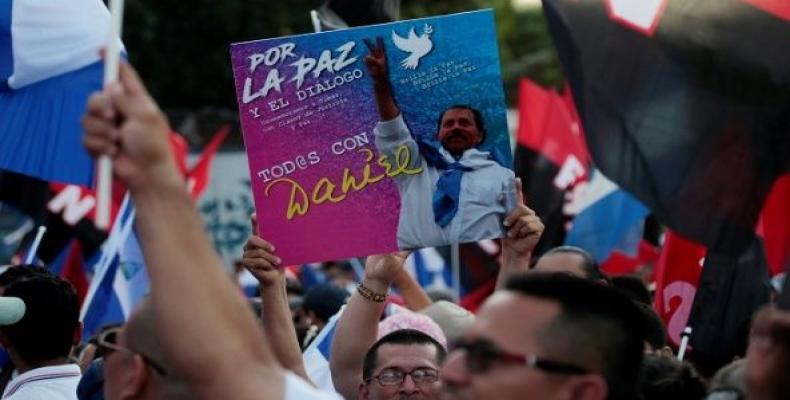Managua, May 7 (RHC)-- The National Assembly of Nicaragua has appointed, ratified and sworn in members of the Commission for Truth, Justice and Peace, who will investigate the deaths and violent acts that happened during the protests against the proposed social security system reform.
The commission will integrate the Franciscan Priest Uriel Molina, Indigenous and human rights activist Dr. Mirna Cunningham, the Vice President of the National Council of Universities Jaime Lopez Lowery, human rights prosecutor Adolfo Jose Jarquin, and economist Cairo Amador.
Over the course of three months, the commission will investigate the death of protesters and other violent acts that took place since April 19, when clashes between protesters and security forces began.
“The Commission for Truth, Justice and Peace is in your hands, and we want to tell you that you're completely free to do the corresponding investigations,” said Gustavo Porras, president of the parliament.
Porras said the commission's members are prominent Nicaraguans who are committed to peace, and who will carry out the investigation with total freedom.
The creation of the commission was approved during a special session of the National Assembly of Nicaragua on April 29, with 74 votes in favor and none against. The opposition Liberal Party didn't take part in it.
In addition to the truth commission Nicaragua's Public Prosecutor's Office launched Friday an investigation into the protests and deaths. "We will start a formal and responsible investigation into the loss of life of students and national police," Prosecutor Ines Miranda said.
“Vandals promoting chaos by burning Catarina's city hall, taking away peace and tranquility from the families of this touristic town.”
After a peaceful day of protests Sunday, violent opposition groups installed barricades, burned buildings and attacked people while they were praying in Catarina and Niquinohomo. Catarina's city hall and the town house of the National Liberation Sandinista Front (FSLN) were set on fire by some vandals.
The protests were sparked by a proposed reform of the social security system, which the government tried to push for without falling for the IMF recommendations that encouraged tougher austerity measures.
Days after the opposition expressed their concerns about the reform, President Daniel Ortega decided to backtrack on it to avoid more blood shed and called for the Catholic Church to mediate the peace dialogues.
On April 24, the Episcopal Conference of Nicaragua accepted to be the mediator and witness of the dialogue between Ortega's government and different opposition groups, including dissident student organizations and the Private Enterprise Superior Council.
The government approved on April 16 the reform of the social security system after several negotiation talks during 2017, with the objective of distributing responsibilities between companies and workers, and thus avoiding the privatization of the service.
Even though the reform was suspended and the government of Nicaragua and the Episcopal Conference issued calls for peace and dialogue, some opposition groups have continued to commit violent acts in the streets of Nicaragua and clash with security forces.
Nicaragua creates Truth, Justice and Peace Commission

Artículos Relacionados
Comentarios
Deja un comentario
Todos los campos son requeridosMás Vistas
- Cuba apuesta por atención integral a personas con autismo
- Parque Científico Tecnológico de Matanzas apoya desarrollo de apk Prosocial
- Catedrático cubano resalta acercamiento al turismo multidestino caribeño
- Oficina alemana de comercio se reune con empresarios del Oriente de Cuba
- Ingresos de la comercialización de vehículos contribuirán a mejorar transporte público

